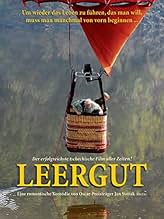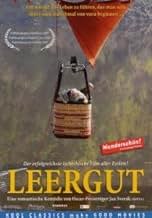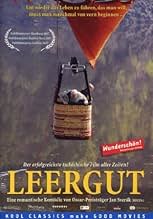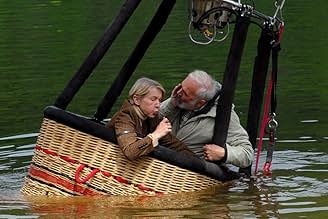NOTE IMDb
7,2/10
5,2 k
MA NOTE
Ajouter une intrigue dans votre langueA comic love story about a man who refuses to accept that old age is empty of love, meaning and value to society.A comic love story about a man who refuses to accept that old age is empty of love, meaning and value to society.A comic love story about a man who refuses to accept that old age is empty of love, meaning and value to society.
- Réalisation
- Scénario
- Casting principal
- Récompenses
- 10 victoires et 12 nominations au total
Tatiana Dyková
- Helenka
- (as Tatiana Vilhelmová)
Nela Boudová
- Ptácková
- (as Nella Boudová)
Avis à la une
The ideal viewers for this film are middle-aged couples. There is a good chance these couples will identify with the couple's story.
Joseph Tkaloun is a literature professor who teaches in a secondary school. He likes literature but has no more patience to deal with annoying and insolent teenagers. He is a dreamer and would like to work on activities that would connect him with real people. He retires from his teaching activities and tries several small jobs as a delivery boy, grocery clerk, etc.
Tkalounová, married for over 30 years with Joseph, teaches languages, is not a dreamer like her husband, and seems quite resigned to her little life between her household which includes also her daughter, recently separated from her respective husband, and her grandson.
The love life of Joseph and Tkalounová is stranded. Joseph has some recurring erotic fantasies which increase his interest in females, but he doesn't succeed to transmit his enthusiasm to his wife.
The daily routine of the couple goes on, punctuated by discussions at home, small jealousies from both sides, an unsuccessful attempt of infidelity from the part of Joseph, the emergence of an admirer of Tkalounová, a boyfriend that Joseph arrange for the daughter of the couple, etc.
Finally a happy end closes this trivial and "tanned" love story of this middle-age couple with surprise balloon ride.
A very nice movie that is really worth to be seen by viewers of middle age. I insist on the adjective middle-age because I think that young people will not understand the essential.
Joseph Tkaloun is a literature professor who teaches in a secondary school. He likes literature but has no more patience to deal with annoying and insolent teenagers. He is a dreamer and would like to work on activities that would connect him with real people. He retires from his teaching activities and tries several small jobs as a delivery boy, grocery clerk, etc.
Tkalounová, married for over 30 years with Joseph, teaches languages, is not a dreamer like her husband, and seems quite resigned to her little life between her household which includes also her daughter, recently separated from her respective husband, and her grandson.
The love life of Joseph and Tkalounová is stranded. Joseph has some recurring erotic fantasies which increase his interest in females, but he doesn't succeed to transmit his enthusiasm to his wife.
The daily routine of the couple goes on, punctuated by discussions at home, small jealousies from both sides, an unsuccessful attempt of infidelity from the part of Joseph, the emergence of an admirer of Tkalounová, a boyfriend that Joseph arrange for the daughter of the couple, etc.
Finally a happy end closes this trivial and "tanned" love story of this middle-age couple with surprise balloon ride.
A very nice movie that is really worth to be seen by viewers of middle age. I insist on the adjective middle-age because I think that young people will not understand the essential.
Czech filmmaker Jan Sverak takes long breaks in between projects, and this is only his second feature film after the Academy Award winning "Kolya" (1996). Again, the film is a collaboration between Jan Sverak the director, and his father Zdenek Sverak, who returns to deliver another memorable leading role. The older Sverak also wrote the film, which becomes more and more evident as the movie goes on.
Zdenek plays a teacher of literature, who is let go of his job, because he can't connect with the modern generation. Though a man in his 60's, he can't bring himself to stay put at home, where the only thing waiting for him is a dull marriage with his wife, who is a German language home-school tutor. So after trying a few things, Zdenek ends up getting a job at a market, where people return the empty bottles to his counter. This is where the English title "Empties" stems from in a literal sense, though it also references the individuals depicted in the film. The old man dreams of younger women and tries to fight against the bottle returning machine, that threatens to replace him at his job.
What the Sveraks have made for us is a feel good movie, one where things improve slowly but surely. It is not plot-heavy at all, nor does it feel dramatic or strenuous as a viewing experience. It is a film, that works well for older demographics. It is lively, but has nothing too shocking in it. The main character's situation may be melancholy at times, but it's not too brooding. The film goes for both funny, and contemplative moments, and in the end, it's a fairly working mix.
For myself, a younger viewer, it's a little too obvious that the film is written by an older man, who worries about what the younger generation has become. The details of the societal depiction are oft-used almost to a point of being cliches. The opening of the film, where Zdenek's character tries to explain a poem to a class of uncaring millenials sets the scene in a black and white manner, and later, the criticism of technology too is simplified and lacks weight. The film is also very loose and light-weight, as films for older people often are. This means that the political commentary wears off and all you are left with is film, that passes the time nicely, even though it's more amusing than actually funny.
What I liked best about "Vratne lahve" was the market scenes, since they carried this Kaurismäki vibe, that worked well for the narrative. Also the acting is great. The characters played by Zdenek Sverak are always a required taste, but after a while, you find some endearing elements about this protagonist too. The supporting cast is also very good. What I liked least about this film was a quick "Kolya" related fourth wall break, since it took me out of the film emotionally. (Then again, if you compare the societal depictions of the two films, you amaze how much the Czech society has changed in the last few decades, which justifies the feeling of modernity being a burden). Also the last scenes did not really conclude the narrative in a functioning way.
Zdenek plays a teacher of literature, who is let go of his job, because he can't connect with the modern generation. Though a man in his 60's, he can't bring himself to stay put at home, where the only thing waiting for him is a dull marriage with his wife, who is a German language home-school tutor. So after trying a few things, Zdenek ends up getting a job at a market, where people return the empty bottles to his counter. This is where the English title "Empties" stems from in a literal sense, though it also references the individuals depicted in the film. The old man dreams of younger women and tries to fight against the bottle returning machine, that threatens to replace him at his job.
What the Sveraks have made for us is a feel good movie, one where things improve slowly but surely. It is not plot-heavy at all, nor does it feel dramatic or strenuous as a viewing experience. It is a film, that works well for older demographics. It is lively, but has nothing too shocking in it. The main character's situation may be melancholy at times, but it's not too brooding. The film goes for both funny, and contemplative moments, and in the end, it's a fairly working mix.
For myself, a younger viewer, it's a little too obvious that the film is written by an older man, who worries about what the younger generation has become. The details of the societal depiction are oft-used almost to a point of being cliches. The opening of the film, where Zdenek's character tries to explain a poem to a class of uncaring millenials sets the scene in a black and white manner, and later, the criticism of technology too is simplified and lacks weight. The film is also very loose and light-weight, as films for older people often are. This means that the political commentary wears off and all you are left with is film, that passes the time nicely, even though it's more amusing than actually funny.
What I liked best about "Vratne lahve" was the market scenes, since they carried this Kaurismäki vibe, that worked well for the narrative. Also the acting is great. The characters played by Zdenek Sverak are always a required taste, but after a while, you find some endearing elements about this protagonist too. The supporting cast is also very good. What I liked least about this film was a quick "Kolya" related fourth wall break, since it took me out of the film emotionally. (Then again, if you compare the societal depictions of the two films, you amaze how much the Czech society has changed in the last few decades, which justifies the feeling of modernity being a burden). Also the last scenes did not really conclude the narrative in a functioning way.
10P-frish
We saw this film when it was first released in Prague, bought the screenplay in Czech, and now own the DVD. This masterpiece from the father-son Sverák team is a gentle low-key story that has appealed here to all ages. It was the most popular movie of the year in terms of theater attendance. The theme is "the search for love" in its very broadest sense, with the sub-theme of the impact of freedom and capitalism on lives in the Czech Republic.
The main character, sixty-five year old Josef Tkaloun, introduces the theme in his classroom of Czech teenagers. In his lesson about a beloved Czech writer, Jaroslav Vrchlicky, he quotes: "For a little love, I would go to the edge of the world bareheaded and barefooted." We follow this theme in his own life and marriage, his daughter's and little grandson's lives, as well as in those of various other characters, young, middle-aged, and elderly, who surround him.
Neither Zdenek Sverák as a writer nor the character of Tkaloun he has written for himself is a judgmental man. Tkaloun's most characteristic response perhaps, is a quiet, "Jo takhle" or "Ah, so that's how it is." Sverák sketches a small world and, within it, gives us a very poignant human story permeated with a feeling of acceptance of all of us in our various weaknesses.
The sub-theme of changes in Czech life since the 1989 revolution may be harder for non-Czech viewers to catch entirely. The local library, for example, has been replaced by a new teeth-whitening business called "Happy Smile." In this one little touch, Czechs will recognize the loss of their public library, the introduction of a strange, expensive, and hitherto unnecessary business, and the current vogue for abandoning Czech for the snobbier, more chic English name.
We also see how the very young, without memories of the "old" days, consider all this as the normal state of affairs, though they realize that their parents or grandparents do not. In a small closely-knit society such as the Czech Republic, relations between generations, whether within the family, at work or school, or in public, have been markedly different in many ways than what one sees in a country such as the U.S. This is now changing with the influx of dubbed television programs, translated popular magazine articles, and advertising. Many youngsters now prefer to go to the mall rather than on the traditional family trip to the countryside, for example. Although most still automatically get up to give their tram or metro seat to an older person, some now ignore this previous mark of well-brought-up behavior.
We should mention, too, that we find the humor delightful. Even on a third viewing we laughed. These performances stand up in the long run.
This movie will definitely be a classic. Thank you Zdenek and Jan Sverák!!!
The main character, sixty-five year old Josef Tkaloun, introduces the theme in his classroom of Czech teenagers. In his lesson about a beloved Czech writer, Jaroslav Vrchlicky, he quotes: "For a little love, I would go to the edge of the world bareheaded and barefooted." We follow this theme in his own life and marriage, his daughter's and little grandson's lives, as well as in those of various other characters, young, middle-aged, and elderly, who surround him.
Neither Zdenek Sverák as a writer nor the character of Tkaloun he has written for himself is a judgmental man. Tkaloun's most characteristic response perhaps, is a quiet, "Jo takhle" or "Ah, so that's how it is." Sverák sketches a small world and, within it, gives us a very poignant human story permeated with a feeling of acceptance of all of us in our various weaknesses.
The sub-theme of changes in Czech life since the 1989 revolution may be harder for non-Czech viewers to catch entirely. The local library, for example, has been replaced by a new teeth-whitening business called "Happy Smile." In this one little touch, Czechs will recognize the loss of their public library, the introduction of a strange, expensive, and hitherto unnecessary business, and the current vogue for abandoning Czech for the snobbier, more chic English name.
We also see how the very young, without memories of the "old" days, consider all this as the normal state of affairs, though they realize that their parents or grandparents do not. In a small closely-knit society such as the Czech Republic, relations between generations, whether within the family, at work or school, or in public, have been markedly different in many ways than what one sees in a country such as the U.S. This is now changing with the influx of dubbed television programs, translated popular magazine articles, and advertising. Many youngsters now prefer to go to the mall rather than on the traditional family trip to the countryside, for example. Although most still automatically get up to give their tram or metro seat to an older person, some now ignore this previous mark of well-brought-up behavior.
We should mention, too, that we find the humor delightful. Even on a third viewing we laughed. These performances stand up in the long run.
This movie will definitely be a classic. Thank you Zdenek and Jan Sverák!!!
Vratné lahve (2007), directed by Jan Sverák, written by Zdenek Sverák, was shown in the U.S. with the title "Empties." The title derives from a second "career," undertaken late in life, by the protagonist Josef (Zdenek Sverák). Josef resigns from his position as a teacher and takes a job accepting returned glass bottles at a supermarket. Complications ensue. Josef isn't exactly an ideal worker, but he does establish a rapport with his fellow employees and with some of the customers.
Josef is married, but he and his wife are tired of each other. (Incidentally, his wife is played by Daniela Kolárová, who looks like the Czech Hellen Mirren.) Josef and his wife are both contemplating adultery, although that's not as easy for them as it might sound.
"Empties" is a comedy, but a comedy with a sad and bitter undertone. Everyone is looking for love, romance, and understanding, but mostly they're looking in the wrong places. Still, the film is worth seeing, especially because of the wonderful acting by Zdenek Sverák, who was outstanding in the film "Kolya" ten years ago, and is equally outstanding in "Empties."
Incidentally, the identical names of the actor/writer and director are not coincidental--they are father and son. That must lead to some interesting moments on the set.
We saw this film at the Rochester High Falls International Film Festival. It will work pretty well on a small screen. It's definitely worth seeking out and seeing.
Josef is married, but he and his wife are tired of each other. (Incidentally, his wife is played by Daniela Kolárová, who looks like the Czech Hellen Mirren.) Josef and his wife are both contemplating adultery, although that's not as easy for them as it might sound.
"Empties" is a comedy, but a comedy with a sad and bitter undertone. Everyone is looking for love, romance, and understanding, but mostly they're looking in the wrong places. Still, the film is worth seeing, especially because of the wonderful acting by Zdenek Sverák, who was outstanding in the film "Kolya" ten years ago, and is equally outstanding in "Empties."
Incidentally, the identical names of the actor/writer and director are not coincidental--they are father and son. That must lead to some interesting moments on the set.
We saw this film at the Rochester High Falls International Film Festival. It will work pretty well on a small screen. It's definitely worth seeking out and seeing.
Can we say that maverick Czech director Jan Sverak has lost his magical art of making wonderful films if his latest offering "Vratné Lahve" were to be considered as an ordinary film ? The answer would be in negative as he has made one of those mischievous films whose message might not instantly dawn on ordinary audiences but allows to appreciate character development which is perfectly in sync with general mood and rhythm of the film."Empties" presents an honest assessment of some very good views of Prague,a city which has changed enormously after the fall of communism and arrival of free market economy.This is not the sole reason for watching this film.One must watch "Empties" in order to understand that a man is young as long as his desire for beautiful young women is intact.In the past,this oft repeated message has been conveyed in numerous films but what makes Jan Sverak film appear as a face in the crowd is that fact that he has chosen to direct his father Zdenek Sverak to direct a film about joys and sorrow of old age of those Czech people who are currently feeling that repressed sexuality of communist times is getting rejuvenated in free market world of capitalism.
Le saviez-vous
- AnecdotesIn the film there is visible a TV program with a highlighted film Kolya (1996), made by the same duo: Jan Sverák (director) and Zdenek Sverák (writer and a main character in both, a father of Jan).
- GaffesEliska is supposed to be a professional teacher of German, yet in the German sentences she speaks in the course of the movie, her German has a heavy Czech accent, much worse than that of her supposed student. And, when Eliska is asked to translate the sentence, "I work for the city administration," her German translation makes no grammatic sense ("an der Stadtamt").
- ConnexionsReferenced in Comeback: Lexa a porno (2008)
Meilleurs choix
Connectez-vous pour évaluer et suivre la liste de favoris afin de recevoir des recommandations personnalisées
- How long is Empties?Alimenté par Alexa
Détails
Box-office
- Montant brut mondial
- 9 864 149 $US
- Durée1 heure 44 minutes
- Couleur
- Mixage
- Rapport de forme
- 1.85 : 1
Contribuer à cette page
Suggérer une modification ou ajouter du contenu manquant

Lacune principale
By what name was Après l'hiver (2007) officially released in Canada in English?
Répondre




































